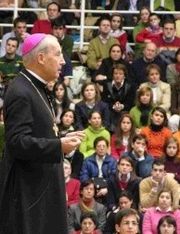
Types of membership of Opus Dei
Encyclopedia

Opus Dei
Opus Dei, formally known as The Prelature of the Holy Cross and Opus Dei , is an organization of the Catholic Church that teaches that everyone is called to holiness and that ordinary life is a path to sanctity. The majority of its membership are lay people, with secular priests under the...
is made up of several different types of membership:
Supernumeraries

Supernumerary
A Supernumerary is an additional member of an organization. A supernumerary is also a non-regular member of a staff, a member of the staff or an employee who works in a public office who is not part of the manpower complement...
" is a civil designation for an additional member of a society, for example professors, judges, actors, etc.
Typically, the supernumeraries of the Opus Dei prelature are married men and women who have secular careers and lead traditional family lives. Supernumeraries often devote a portion of their day to prayer, in addition to attending regular meetings and taking part in activities such as retreats. Due to their career and family obligations, supernumeraries are not as available to the organization as the other types of members, but they typically contribute financially to Opus Dei, and they lend other types of assistance as their circumstances permit. Unlike other types of members, supernumeraries are not required to be celibate.
Numeraries

Numerary
Numerary is a civil designation for persons who are incorporated in a fixed or permanent way to a society or group: regular member of the working staff, permanent staff, or member, distinguished from a supernumerary....
" is a general term for persons who form part of the permanent staff of an organization.
Both men and women may become numeraries in the Opus Dei prelature, although the centers are gender-segregated, with only minimal contact between male and female numeraries. Numeraries are required to be celibate. Numeraries generally have normal careers and devote the bulk of their income to the organization. According to Opus Dei's 1982 statutes, potential numeraries ordinarily "ought to have a civil academic degree or professional equivalent, or be able, at least, to obtain one after the admission"
Priests
The priests of Opus Dei comprise about 2 % of the membership. They always hail from among the male numeraries and associates and have typically lived as lay members for several years before their ordinationOrdination
In general religious use, ordination is the process by which individuals are consecrated, that is, set apart as clergy to perform various religious rites and ceremonies. The process and ceremonies of ordination itself varies by religion and denomination. One who is in preparation for, or who is...
. At their ordination, they are incardinated into the Personal Prelature of the Holy Cross and Opus Dei, meaning the prelate
Prelate
A prelate is a high-ranking member of the clergy who is an ordinary or who ranks in precedence with ordinaries. The word derives from the Latin prælatus, the past participle of præferre, which means "carry before", "be set above or over" or "prefer"; hence, a prelate is one set over others.-Related...
of Opus Dei becomes their bishop. Priests of Opus Dei observe the same disciplines as numerary members, including living in Opus Dei centers and practicing corporal mortification.
The Priestly Society of the Holy Cross is the association of priests associated with Opus Dei. Part of the society is made up of the clergy of the Opus Dei prelature-- members of the priesthood who fall under the jurisdiction of the Opus Dei prelature are automatically members of the Priestly Society. Other members in the society are traditional diocesan priests--- clergy who remain under the jurisdiction of their diocesan
Diocese
A diocese is the district or see under the supervision of a bishop. It is divided into parishes.An archdiocese is more significant than a diocese. An archdiocese is presided over by an archbishop whose see may have or had importance due to size or historical significance...
bishop
Bishop
A bishop is an ordained or consecrated member of the Christian clergy who is generally entrusted with a position of authority and oversight. Within the Catholic Church, Eastern Orthodox, Oriental Orthodox Churches, in the Assyrian Church of the East, in the Independent Catholic Churches, and in the...
. Technically speaking, such diocesan priests have not "joined" Opus Dei membership, although they have joined a society that is closely affiliated with Opus Dei.
Numerary assistants
Numerary assistants are unmarried, female members of Opus Dei. Like the numeraries, they live in special centers run by Opus Dei. Unlike numeraries (who may be men or women), the numerary assistants do not have conventional jobs outside of the centers-- instead, their professional life is dedicated to looking after the domestic needs of the centers. Numerary assistants are required to be celibate, and they generally practice corporal mortification.Associates
Associates are unmarried, celibate members who typically have family or professional obligations. Unlike numeraries and numerary assistants, the associates do not live inside the special Opus Dei centers.The official statutes of Opus Dei discuss Associates thus:
Those lay faithful are called Associates, who surrender their full life to the Lord in apostolic celibacy in keeping with the spirit of Opus Dei; nevertheless, they must devote themselves to concrete and permanent personal, family or professional obligations which ordinarily lead them to live with their own families. They resolve all these things, at the same time as they fulfil some duty of apostolate or formation in Opus Dei.
Cooperators
The Cooperators of Opus Dei are those who, though not considered members by Opus Dei, collaborate in some way with Opus Dei-- usually through praying, charitable contributions, or by providing some other assistance. Cooperators are not required to be celibate or to adhere to any other special requirements. Indeed, cooperators are not even required to be Christian.Cooperators may attend the educational and training activities provided by the Opus Dei. Many cooperators are relatives, friends, colleagues and neighbors of the members of Opus Dei. Religious communities as a whole can also become cooperators of Opus Dei. There are currently number several hundred of these communities who pray for Opus Dei daily.
Admission and Incorporation
To become a member of Opus Dei one has to receive a divine calling or a vocation, a calling which requires practising the modes of the Opus Dei prelature. For this the directors of Opus Dei will have to discern if someone does have the vocation, before allowing him to be incorporated into the prelature.Incorporation into Opus Dei is done through a written contractual
bond between the person who has the vocation and the prelature.
Manner of incorporation
There are some key procedures that be followed for someone to become a member of Opus Dei:Freedom:In order to join Opus Dei a person must freely ask to do so, in the personal conviction of having received this divine vocation. He may find this out through his prayer and usually with the help of a spiritual director.
Adulthood:In accordance with canon law, no one may be juridically incorporated into the prelature until he has reached 18 years of age.
- Nevertheless, from the age of 14 years and 6 months, a young person can show his interest in the organization, and begin to participate in its activities: recollections, retreats, seminars, spiritual direction, apostolate.
Written request:The request is made in writing.
Acceptance by the prelature:The request needs to have been accepted by the authorities of the prelature and admission is granted after a minimum of six months. After a period of at least a year, the interested person can be incorporated temporarily to the prelature by means of a formal declaration of contractual nature. This is known as oblation, and is renewable annually.
Stages of membership: Admission and incorporation
Admission is granted after a minimum of six months.After an additional period of at least one year since the moment of his admission, the person can be temporarily incorporated into the prelature (oblation) through a formal declaration of a contractual nature, which is renewable annually.
After a minimum of five more years, the incorporation can become definitive. This step is called Fidelity, that ties to perpetuity to the member of the Opus Dei. If the member wishes to leave the prelature, he needs a dispensation which the Prelate alone can grant.
If anyone, before incorporation as a Numerary or Associate is seen to lack suitability for that, he may be retained as a Supernumerary, as long as he has the requisite conditions.
Content of the incorporation and contract
On the part of the prelature: The prelature is committed to provide the member with formation in the Catholic Christian faith and in the spirit of the Work, as well as the necessary pastoral care from the priests of the prelature.On the part of the person to be incorporated: incorporation means the commitment to remain under the jurisdiction of the prelate in all that concerns the aim of the prelature: sanctity and apostolate in the middle of the world. He is also to observe the norms by which the prelature is governed, and to fulfill the other obligations of its faithful.
In summary, all the faithful of the prelature commit themselves to seeking sanctity and to carrying out apostolate according to the spirit of Opus Dei. This involves, principally, growing in spiritual life through prayer, sacrifice, and receiving the sacraments; using the opportunities that the prelature provides for acquiring a deep knowledge of the doctrine of the Church and the spirit of Opus Dei; and taking part in the task of spreading the Word carried out by the prelature, according to the circumstances and situations of each person.
Cessation of the bond and "lawful" departure
At the end of the term of the contract with the prelature the bond with the prelature of Opus Dei ceases. It can also end earlier, if the member requests for it in agreement with the directors of the Opus Dei. If permission for departure is given it is considered a "lawful departure" ("exitus legitimus" according to the currently applicable Latin version of Opus Statutes).When someone leaves the prelature lawfully, there is a cessation or ending of mutual rights and duties.
Opus Dei does not give back any goods or money received during membership.
- 29."During temporary incorporation or when the definitive [incorporation] has already been made, for anyone to voluntarily leave the Praelature, he needs a dispensation which the Prelate alone can grant, after hearing from his own Council and Regional Commission".
- 30."The faithful, either temporarily or finally incorporated into the Prelature, cannot be dismissed except for serious causes which, if it is a question of final incorporation, always ought to proceed from the fault of the faithful person, himself".
- "Bad health is not a reason for dismissal unless it has certainly been established that it was deceitfully concealed or dissembled before temporary incorporation".
- 34."The person, who for whatever reason says farewell to the Prelature or is dismissed by it, can demand no recompense from it for services rendered to it, nor on account of what, whether by [his] industry or exercise of his own profession, or by any title or manner might have been paid him".
In other words, no departing member of Opus Dei may receive any compensation of any sort for the contributions that they may have made to Opus Dei during their time in the organisation, this applies to all categories of membership.
When, however, someone leaves the prelature unlawfully (i.e. without the permission of the Prelate) he or she is considered by continuing members to be in a state of mortal sin
Mortal sin
Mortal sins are in the theology of some, but not all Christian denominations wrongful acts that condemn a person to Hell after death. These sins are considered "mortal" because they constitute a rupture in a person's link to God's saving grace: the person's soul becomes "dead", not merely weakened...
, and there is usually no further contact between the ex-member and his or her former friends and associates.

